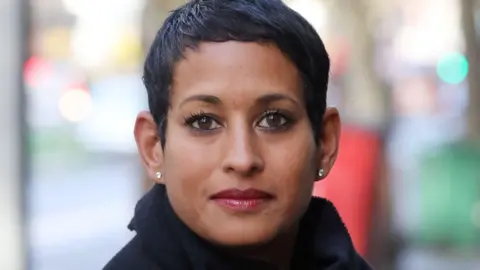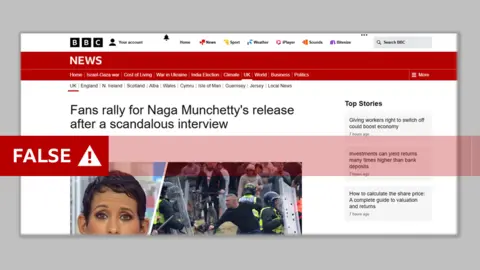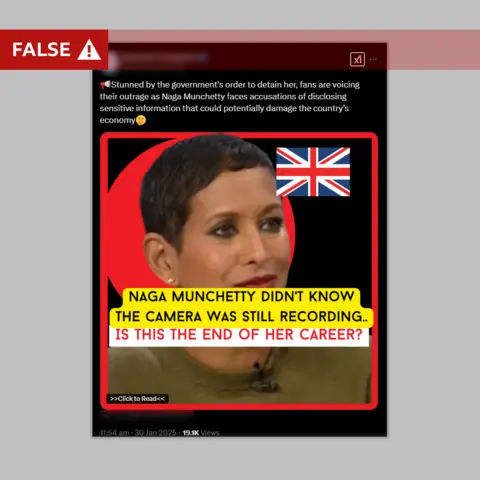Scammers spread fake nude pictures of me on social media
Naga Munchetty
BBC presenter
 Alamy
Alamy
“Naga Munchetti: This is the most humiliating day of my life. Yesterday’s news shocked the whole of the UK.”
The headline was enough to make me want to read more – but the fact they had spelled my name wrong made me immediately question the credibility of the journalism involved – if there was any.
I’m used to seeing misleading articles about myself online, but the screenshots I’ve been sent by friends and followers on social media in recent weeks are a lot more insidious than most.
Paid-for advertisements are popping up across X and Facebook, some including crudely mocked-up images of me naked – my face badly photoshopped onto someone else’s body.
I was both mortified and bemused, curious about who would pay good money to spread such obvious nonsense. And what was their motive? Is it something malicious? Someone with an axe to grind?
I discussed it with my 5 Live production team, and we began to dig into it more. It soon became apparent that my name and image were being used by scammers to try to hoodwink people out of money.
Clicking on the adverts took you through to a fake news article, complete with BBC logo and imagery.

This fake image, which never appeared on the BBC News website, falsely claimed Munchetty had given a “scandalous interview”
The fake article about me suggested I had been detained by the government following a “controversial” interview on ITV’s This Morning, where I allegedly gave details about a “lucrative loophole” to make money.
It was made to look like a BBC News article, complete with logo and branding, and it contained links to a scam cyber trading website, which has now been taken down after my production team reported it to the BBC legal team.
I’m not the first high-profile face to be used by scammers to trick people out of their hard-earned money.
My fellow 5 Live presenter and Money Saving Expert, Martin Lewis, has previously spoken out about his face being used to front cryptocurrency scams.
Wildlife TV presenter Chris Packham told me he first saw fake articles about himself appearing on social media two years ago.
“Recently I opened an account with Bluesky and within hours there were fake accounts re-posting these scams from other platforms,” he said.
“The ones on Bluesky were a bit more sophisticated in that scammers set up a ‘conservation fund’ with my identity and did some research and directly sent it to lawyers who I work with on environmental projects asking for ‘donations’
“On a personal level this affects my credibility as an environmentalist and campaigner. As a communicator you need trust and for people to believe what you’re saying and know I’m telling the truth and this impacts that.
“I hate the idea of my image being used to scam, it’s abjectly terrible.”
Lisa Barber, tech editor at Which?, said one of their reporters had signed up to a website linked to from a false advert, similar to the ones written about me and Chris, and was “bombarded” by calls from somebody encouraging them to invest their money.
“The registered addresses all seem to lead to Reyjkavik in Iceland, and even a car park there,” she said.
“Our reporter could sometimes hear other people making calls in the background, which makes us think it was a call centre. There was so much pressure on [our reporter] from the caller – quite an aggressive sell.”
“People have lost hundreds and some thousands through this. It’s really convincing and relatively new, but social media platforms need to do more.”
The fake photos and articles being spread around online are mildly upsetting, but my main motivation for speaking out about them is to try to stop anyone handing over any money or personal information to these scammers.
I was lucky that the BBC legal department were able to use copyright law to have the website taken down, but I’ve been told another website is likely to pop up soon enough, and getting ads taken down from X has become more difficult since it changed ownership.

This fake post on X falsely claims the government ordered Munchetty to be detained
Meta, who own Facebook and Instagram, said: “We don’t allow fraudulent activity and work closely with law enforcement to support investigations and keep scammers off our platforms. We continue to work closely with Stop Scams UK to help victims and remove scams at the source.
“As part of our ongoing work on this issue, we announced a new partnership earlier this year with UK banks to combat scams called FIRE programme. This is a first-of-its-kind information sharing partnership with banks, allowing banks to share intelligence directly with us to combat scams on our platform.
“People can report ads they believe violate our policies by clicking the three dots in the upper right hand corner of the ad. These reports are an important signal to our ad review systems, and may prompt a re-review of the ad. This feedback also helps to improve our policies and enforcement.”
The BBC has also contacted X and Bluesky for comment.
I hope that raising awareness of this scam may at least make it less worthwhile for the criminals involved, and it serves as a useful reminder to not believe everything that you read about me – and be careful what you click on.
Listen to Naga Munchetty on 5 Live and BBC Sounds, Monday – Wednesday from 11:00 GMT.
#Scammers #spread #fake #nude #pictures #social #media

